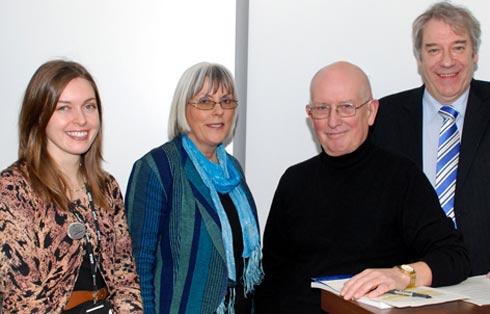Open College archive
Thu, 16 Feb 2012 10:43:00 GMT
Valuable archive tells the story of inspirational initiatives in education

At the handing over of the Open College archive were, from the left, Amy-Jo Cameron-Williams, who is the University's Archivist and Records Manager; Dr Janet Hargeaves, Associate Dean (learning and teaching) in the School of Human and Health Scioences; donor David Browning and Dr Martyn Walker, who is the University's Head of Department for Post Compulsory Education and Training.
AN important archive of books and papers charting educational initiatives that have enabled thousands of people to overcome obstacles and fulfil their full potential has been deposited at the University of Huddersfield.
It is hoped that the material will not only enable historians to study the Open College movement, Access to HE programmes and Northern College Barnsley, but also help to make a powerful case for these forms of adult learning, dedicated to widening access to Higher Education.
The archive – which will probably be augmented from other sources in years to come – was donated by David Browning, a resident in Huddersfield, who was a key figure in Open College developments and the mission to develop alternative routes to university study.
There are now regional Open College Networks operating across England, Wales and Northern Ireland and Open College credits are accepted as national qualifications, enabling adult learners to progress through Adult, Further and Higher Education as well as community, workplace and Trade Union-based learning.
In the late 1970s, David Browning joined the staff of Northern College in Barnsley, as Tutor-Organiser for community-based learning. In 1985 he was appointed the first Director of Manchester Open College Federation (MOCF) which had been established four years earlier. MOCF offered learners opportunities to study at a number of levels – beginning with basic literacy skills in many cases – and acquire credits that would, when accumulated, be the equivalent to O and A-levels. Negotiations with universities across Greater Manchester led to OCN credits gained in Access to HE programmes to be accepted as entry qualifications for degree studies.
Manchester Open College broke the mould by showing that there were credit-based alternatives to conventional school and exam-based qualifications, said David Browning.
“Whatever the learning was and wherever it took place – at work, in the community, in a college or at home – it could be recognised and would be internally and externally rigorous,” he added.
The idea of credit-based systems, and the accumulation of credits at several levels were based on Community College system in the USA. Manchester’s Open College founders visited and studied those systems, said Mr Browning.
“They have shown how it is possible to develop non-standard curricula which enable people to aim for whatever they want to learn in any particular area. Some of the best courses that I managed and accredited were in everyday things like needlework and dressmaking. They enabled people to re-establish their learning and begin to rearrange their own lives in a way that they wanted.”
Among the highlights of the archive that Mr Browning has handed over to the University of Huddersfield is a collection of 100 case studies in which people wrote their own accounts of learning progression through Open College programmes.
“I can’t read them without crying,” said Mr Browning, who came from a working-class background in Northumberland. “I see myself and my own struggles within these case studies. They are really heartening to read. People liberated by more open and accessible adult education processes.”
In 1986, the National Open College Network was founded, initially with nine members. By the early 1990s it had registered 125,000 students and issued 400,000 credits and these numbers continued to soar, so that when the 20th anniversary of the NOCN was celebrated, there were five million students registered in England, Wales and Northern Ireland.
Dr Martyn Walker, who is Head of Department for Post Compulsory Education and Training at the University of Huddersfield, said: “The Coalition Government places heavy reliance on private industry to support personal development and staff qualifications. Unfortunately, the economy is such that there are fewer and fewer of those opportunities unless people go into quite severe debt.”
Therefore, one of his hopes is that the archives deposited at the University of Huddersfield will enable research to be conducted that will bolster the value of lifelong learning and the Open College movement.
One of the reasons that the University of Huddersfield was such a fitting destination for the archive, said Mr Browning, was that its own roots were in initiatives such as the Mechanics’ Institutes which enabled working-class people to gain a valuable education.







